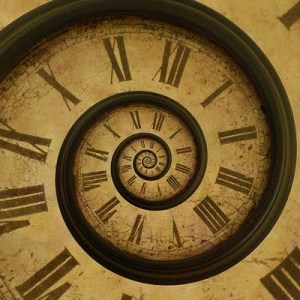As is no doubt obvious, this blog has gone dormant for a time due to the busy-ness of life, what with kids home for the summer and then a busy academic year. But after this unfortunately extended time off from this blog, I want to pick up where I left off.
As promised ages ago, I first want to write (or rather finish writing) a post that both explains and lays out my position on the the concept of linguistic relativity, and how I think language, thought, and culture are interrelated. I also have few one-off ideas on topics such as semantics, memetics, and the formulaic nature of language, as well as some hopefully fun and light-hearted posts (which I'll keep under wraps for the moment).

But my big plan is to go back to the topic which I've been working on, on and off, for over 15 years now, time in language and thought. My doctoral dissertation was on the coneptualisation of futurity in Old English, and came out of an interest in how English developed from a language that didn't originally have a systematic way of expressing the future, and how this might relate to the Latin language which does have grammatical future tense, the adoption of a new religion, Christianity, which has important conceptual foundations involving a notion of future time, new philosophical concepts such as the free will/predestination debate, etc. So first of all, I'll review some of that research (and how my thinking may have changed in some ways since then), but also much of the attendant background to this topic, about time in general in thought and language, which will give me a chance to write about some of the stuff that was too tangential or just didn't fit with the dissertation.
There has also been an explosion of work over the past decade or so, and particularly in the last couple of years, on topics that relate to this, such as the work by Lera Boroditsky and a number of other scholars on how we use space to think about and talk about time (and also in particular the research by Daniel Casasanto and Vyvyan Evans), or by David Eagleman on time perception, and even popular nonfiction books on time, such as Claudia Hammond's Time Warped and physicist Adam Frank's About Time. My own most recent conference paper dealt in large part with spatio-temporal metaphor in Old English. But in an attempt to keep these posts fairly informal, easily approachable, and not overly wrought, as was my original intention when I started this blog, I'm going to try to write about these topics in an off-the-cuff manner without putting a lot of advanced planning into organization. So they'll be a little haphazard as I jump from one topic to another as I think of them in an attempt to get the ideas down quickly.1
It's often pointed out that time is the most common noun in the English language (and is similarly high ranking in other languages too), and that three of the top five nouns are time-related words (the other two being year and day). Personally, I've always been interested in and maybe even obsessed with the notion of time, how we think about time, how we talk about time. I've always been fascinated by clocks and watches,2 and I've always been drawn to stories about time and especially time travel, such as the tv show Doctor Who and my favorite children's book The Story of the Amulet by E. Nesbit. Even before I started in on my graduate school work I became fascinated in the free will / predestination debate and as an undergraduate read Boethius' Consolation of Philosophy and the debate on free will between Desiderius Erasmus and Martin Luther. Indeed even now I often include a number of texts in my regular teaching rotation that pick up on themes and motifs of time, such as Alice Munro's "Walker Brothers Cowboy", Stephen Leacock's "The Retroactive Existence of Mr Juggins", Robert Heinlein's "By His Bootstraps", and the Christopher Nolan film Memento, so I also want to post about literary representations of time, including more popular forms of literature and entertainment.
So if you're interested in a somewhat chaotic series of reflections on time in language, thought, and culture, then watch this space...3
1 Organizing these ideas into something more cohesive may be a project for a later time. [back]
2 An antique Waltham pocket watch given to me by my mother is one of my prized possessions. [back]
3 I’m hoping that having posted this, I will now be more motivated to follow through with it and do it, but any words of encouragement will certainly help give me a kick in the complacency. [back]
